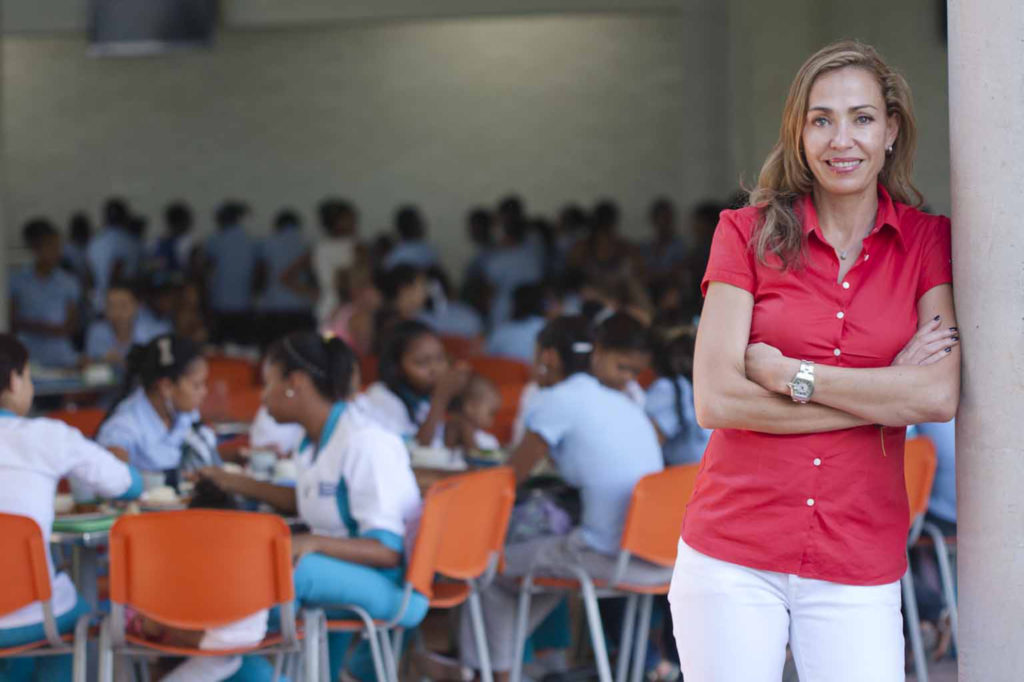
When the baby died in her arms, Catalina Escobar ’93 knew she had to do something.
Volunteering in a hospital in Cartagena, Colombia, Escobar was helpless as the infant passed away. She later learned that the child could have been saved if his mother had been able to afford the $30 needed to pay for life-saving medication.
A short time later, Escobar experienced a tragedy that hit even closer to home. Her 14-month-old son, Juan Felipe, died in a freak accident when he fell from the balcony of their eighth-floor apartment in Cartagena.
Escobar then made a decision that changed her life and the lives of thousands in her city. In 2002 she launched the Juan Felipe Gomez Escobar Foundation, which works with one of the most marginalized populations in Cartagena: impoverished teenage mothers and their children.
For her tireless work on behalf of the poor, Escobar was voted one of ten CNN Heroes in 2012 (out of 45,000 nominees). She received the award, and the $50,000 prize that went with it, at a star-studded event that aired live on CNN on Dec. 2.
The award is great because it opens doors, Escobar says. But, she adds, “You don’t work to be a hero — you work for humanity.”
Her foundation (“Juanfe” for short) has lowered the infant mortality rate in Cartagena — the highest in Columbia — by 80 percent in the first six years of operation. (A staggering 30 percent of all pregnancies were to teenagers; the foundation helps girls between the ages of 12 and 19.)
“What perpetuates extreme poverty is teenage pregnancy,” Escobar explains. “We need these girls to break the poverty cycle. We give them the empowerment tools to move forward.”
In Cartagena, two-thirds of the population lives below the poverty line, with one-fifth in “extreme misery” — and 90 percent lives within 5.8 square kilometers. There can be upwards of 16 people living in one small house, and children routinely witness different family members having sexual relations. Girls often start being touched inappropriately at 6 or 7, and graduate into sexual relationships by the time they enter puberty, Escobar says.
“They see sex [at a young age] as a normal thing,” she notes. “They don’t know anything else.” Of the girls who enter the Juanfe programs, 70 percent have their first pregnancy between age 14 and 16. Eighty percent have been sexually abused.
The foundation built, equipped and operated an intensive care unit at a public hospital to provide health care to babies and their teen mothers, but Escobar realized the problem was bigger and raised funds to build a center where the mothers could get additional assistance. The girls are recruited after they become pregnant for the first time. Juanfe can only accept 450 girls, though there are about 5,000 teen moms in Cartagena every year. For the first six months they receive health care, intensive counseling and education.
The second part of the program takes longer. The girls are given training and assistance to graduate from high school, with the goal of getting them into a normal trajectory of teenage development. Many times, however, their own family members will try to bring the girls back into their old lives because “they never had the opportunities themselves,” Escobar says. The foundation deploys staff in the community to counsel families.
The Juanfe goal is to interrupt the standard cycle: When a girl gets pregnant, she drops out of school. The next year she’ll typically be pregnant again, and the year after, Escobar observes. And those babies will grow up poor. “Within two to four years we take them out of extreme poverty — if they follow our strict protocols,” she says.
To date, the foundation has had “high social impact,” Escobar says. The teen mothers leave their children in an on-site day care center while they receive counseling and skills training. The center feeds about 650 girls and their babies daily, and 4,200 mothers and their children have been rescued from extreme malnourishment.
Prior to starting Juanfe, Escobar ran a successful medical product company. A business major with a minor in economics, she says that while Juanfe may be a social foundation, she runs it like a major corporation. To secure funding from sources like the Inter-American Development Bank, she is seeking partnerships with academic institutions — including MIT’s Poverty Lab — to conduct studies that back up her statistics.
“The only thing I know in life is philanthropy and business,” she says. Her father was an entrepreneur who ran his own economic group. Her older brother studied business at Clark, and after spending some time in Europe post-high school, Escobar followed him to Worcester. “I love my Clark,” she says, recalling fond memories of living in Dana and Hughes halls.
Escobar was happy to get to know the other CNN Heroes in the days leading up to December’s televised tribute. The bottom line for her was not winning an award, but rather shedding light on the good works being done by a corps of “regular human beings.”
“We’re just crazy people who are trying to change the world,” she says.
